Whale Watching - Rare Experience - Monterey Bay
Whale watching can be an extremely time-consuming activity requiring lots of patience. In the end, there is no guarantee that you will be able to see this magnificent marine mammal. Those who are lucky and get to see the Whale, and this author is one of them, have no hesitation in accepting that it is a totally mesmerizing experience. The majestic swim, the fountain of water it throws up in every breathing cycle, are all seen to be believed. The tail jutting out of water is breathtaking and is a signature whale watching shot for a photography enthusiast. And, the vertical lunge revealing the underbody of the Whale mouth is just out of this world. As they say, a joy shared is joy doubled. Accordingly shared below is the experience with a good number of pictures for different Whale shots mentioned above and more. So enjoy the trip, and one fervently hopes, you get to feel the experience almost.
When at first you don’t succeed, Try Try Again. So goes the nursery rhyme all of us learned in our childhood. It was disheartening when many early attempts at Whale watching at different locations yielded nothing more than a pleasant boat ride on high seas which in themselves are very relaxing and tranquilizing. Disappointed, but not defeated. One Persisted. Lady luck had to smile someday and Monterey Bay was the location chosen by it to smile on us. And what a smile it turned out to be!
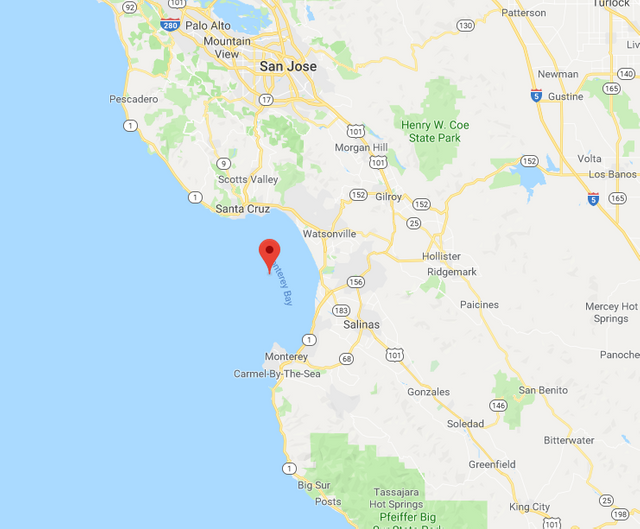
Bay is located in California state of United States of America on its Pacific Coast. It is down south from San Jose and is about 2 hrs. driving distance from San Francisco airport. As we drove to Monterey there was a lot of fun in the air. Enjoying our drive-in beautiful sunshine, there was a sense of anticipation and hope - we are going to be lucky this time. We had to board our Vessel relatively early in the morning the next day. It was a 3.5 hrs. trip heading almost an hour into the sea. As we left the Fisherman’s Wharf in the morning, we were given a lazy send-off by a group of ‘Sea Lions’ enjoying a cosy nap in the company of each other.
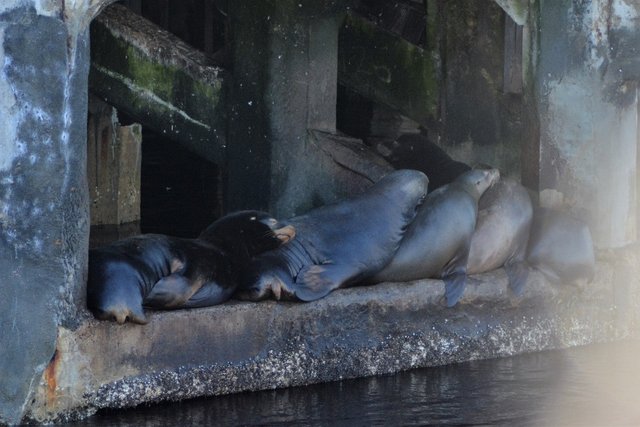
Cameras ready, the conversation with the experts on board centered around this breath-taking marine mammal – the Humpback Whale. It is a species of Baleen Whales. It normally weighs around 25-30 metric tons and is 12-16 meters long. The expected lifetime is around 45-50 years. They are found near the coastlines when not migrating. While all this banter and chit chat was going on over a cup of coffee, we witnessed a Pod (or shall we say a Superpod) of Dolphins racing our vessel in front of us. It was a mesmerizing picture.
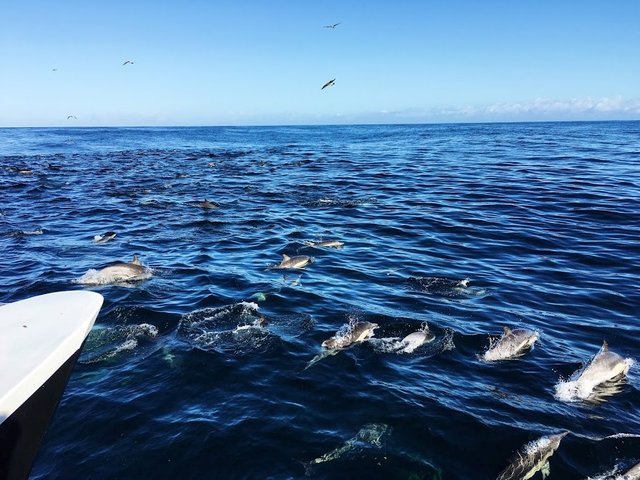
Busy in soaking in all the information, the great action around us and the strong air flow standing outside, we never realized that it had been almost an hour since we boarded the vessel. Until the Captain announced over the PA system that we are now in the zone where Whales are spotted and we should be on the lookout. Our wait was not very long. We spotted the contours of a Humpback Whale and all were very excited.
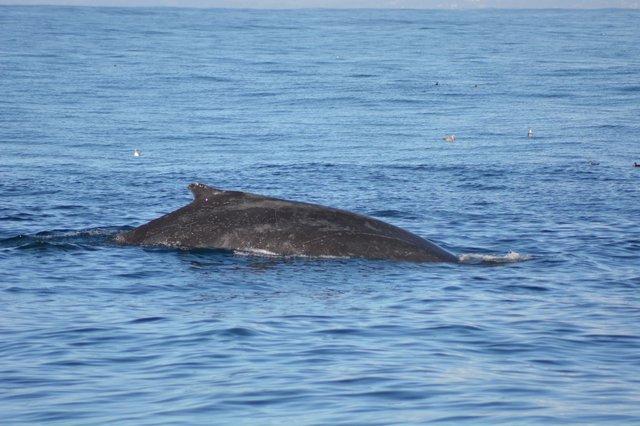
At last. This time we are lucky. There was a sigh of relief and pleasure. The cameras started to roll. All kind of zoom lenses, wide angle lenses, video cameras, and even mobile cameras were suddenly in operation. The camera click and shutter sound were all over the place. And the whirring noise of automatic zoom lenses. People were waiting with bated breath for the Humpback to come up the surface and give a better view. And then suddenly there were ‘Oos’ and ‘Ahhs’ when everyone saw another humpback surface on the side. It was an amazing sight.
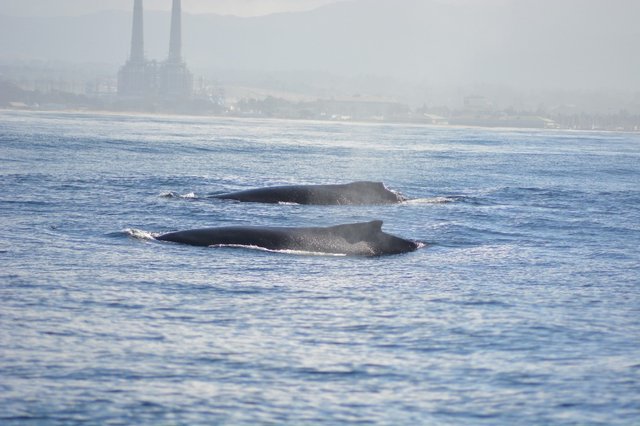
The sight of two Humpback Whales was more than what people had asked for. There were smiles, laughter and pure ‘Joy’ all around. The family members were showing each other the shots they had captured with the assorted devices they had and were basking in the glory of photographic accomplishments. But no one had the faintest of an idea that we were on to something much bigger and grandeur. Not even the captains and crew of the vessel. And then all of a sudden it started to unfold. We realized it was not just these two Whales but there is a school of Whales around. The pleasure transformed in ecstasy very quickly. People couldn’t believe their eyes.
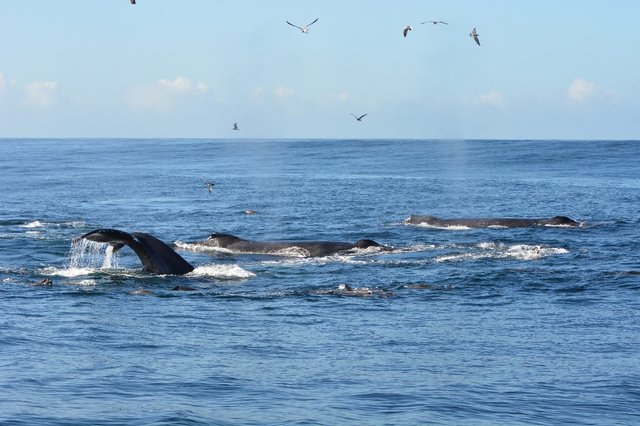
For the next hour or so we saw a phenomenon called ‘Whale Feasting'. We saw everything that a Whale watcher could have asked for and more. We captured all the signature Whale shots.
Whale Fluke
A Whales tail is called a ‘Fluke’. Taking a picture of the Fluke jutting out of the water is the most coveted signature shot for Whale watching experience. A Fluke is made of two lobes separated by a deep notch. Flukes don’t contain any bones. They are made up of dense, fibrous connective tissues surrounded by a network of arteries and veins. The Flukes are moved up and down by long muscles that run above and below the backbone. It is the Flukes that propel the Whale in the water.

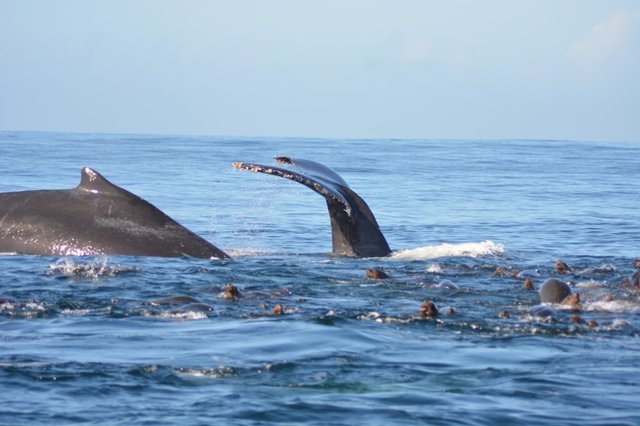
Whale Spouting
Humpback Whales live at the surface of the Ocean. Both in the open sea as well as shallow coastline waters. When a whale comes to the surface after a dive, it breathes out the “old” air quickly, all in one breath. This air rises up like a fountain and is called a ‘Whale Spout’. But it is not a fountain of water. Instead, it is a stream of warm air being forced out of the whale's lungs, aka the Whale's breath. It was a sight to see Whale Spouts all over and so many times.
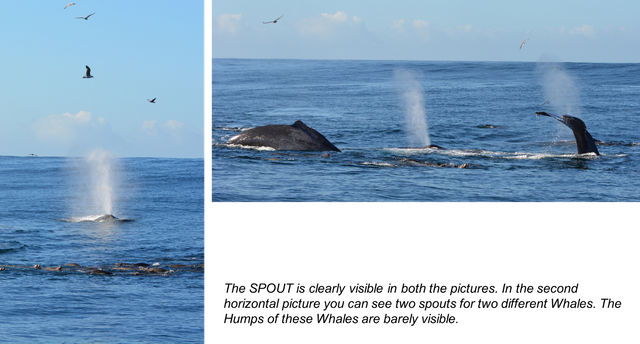
The Vertical Lunge
The Whales are known for this typical action. They lunge from the sea vertically and then fall back with a big splash. This is also one of their feasting action (though they also feast while swimming horizontally). We were lucky to witness multiple Whales lunging and falling back. It was a very rare sight that we were witnessing. As per the Captain of the vessel and its crew, they never saw something like this before. A school of about 6 to 7 Whales lunging and spouting every now and then. The captain explained to us that the Whales were having a feast.
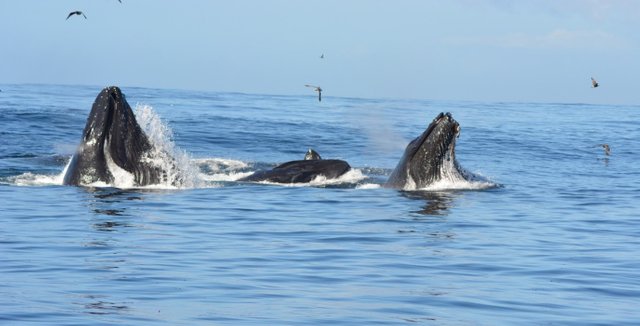
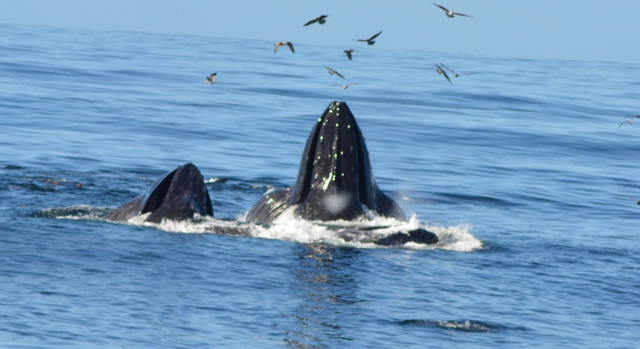
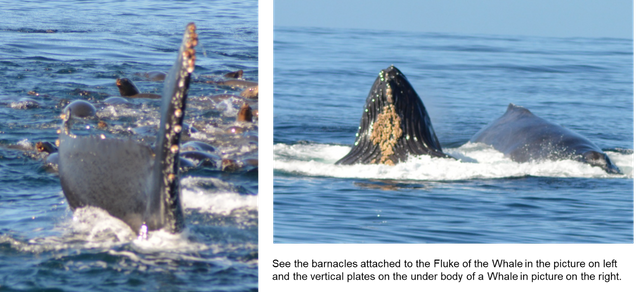
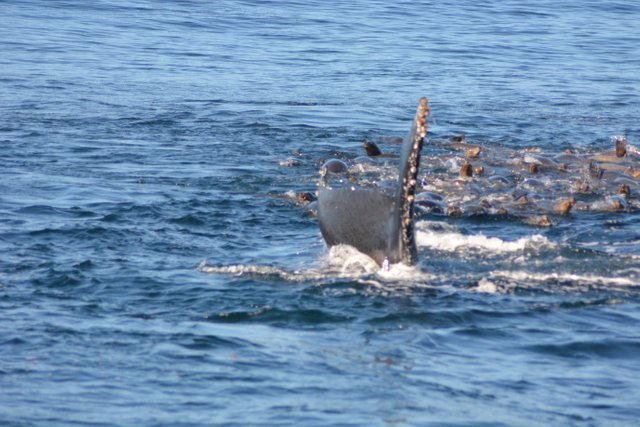
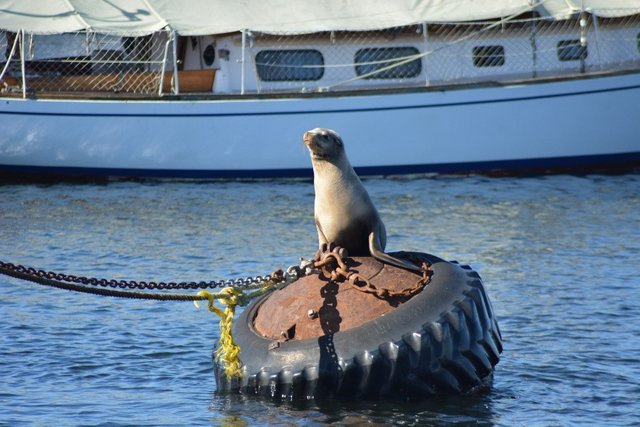


After seeing some typical Whale shots it is now time to understand some other finer points of their ecosystem. First one is the funny looking objects attached to the outer skin of a Whale. These are called Barnacles. We saw plenty of them at all sorts of places over the Whales body. The second one is the whole activity of Whale feasting which we mentioned briefly under vertical lunge but present more details below.
Barnacles
Barnacles are Shrimp like animals standing on their heads. The attach themselves to Whales and live off it. In the pictures above you see small objects attached to the skin of the Whale. These are Barnacles. They attach themselves in large numbers but in relative terms, they are insignificant given the overall weight of Whale – say about 1000 lbs out of a weight of Whale which is probably in the region of 80,000 lbs.

Whale Feasting
Whales eat species available in the ocean. The feed on krill, shrimps, school of small fishes, zooplankton etc. Typically a Whale taken in a very large amount of water from the sea and then closes its mouth. The baleen bristles present in the mouth allow it to strain the water out while retaining the krill, fishes etc. as its feed. The Whales are known to adopt either ‘Skim feeding' technique in which case it swims with its mouth open and takes in a very large amount of water in its mouth. It then performs the action mentioned above to get its feed. Alternatively, they also do a lunge feed where they come up from inside the water lunging up with mouth open. They again take in a very large amount of water and later strain out the water to retain the feed. A Whale could be consuming about 1100 kg plus of kill a day during feeding season. While the Whale feasting is going on it is not uncommon to find ‘Sea Otters’ around who feed on the remnants or the fish that escape from the Whales baleen bristles. See the colony of Sea Otters in the picture below.

The entire spectacle went on uninterrupted. While the Whales feasted on their feed, enjoyed the breaching, lunging, and swimming, the passengers had a parallel feast for their eyes and cameras. It was time to go head on the return journey. The feasting was continuing and no one wanted to head back. The show was going on for more than an hour. The schedule could not be set aside more than that. So there was no choice and with a resigned body language, people started to troop into the inside portion. But soon the banter picked up as everyone was showing everyone their photographic treasures and were excitedly exchanging notes on the entire experience. Many exchanged WhatsApp numbers and email ids with a promise to share and upload the images and videos. The 45-minute journey back was no less noisy. Everyone had a sense of accomplishment that they had been witness to one of the rare occurrences in Whale watching world.

As we pulled into the Fisherman’s Wharf on our return, we saw the old friend Sea Lion perched on top of a mooring. As if enquiring from us – Hello mate! How was the day? Hope you enjoyed? How I wish I knew their sound language to communicate back and answer – You bet buddy! It was an unbelievable and a fantastic day at that. We had a ‘Whale of a Time’.
Great post rgov keep them coming
Thanks. Your words of encouragement appreciated.
You're welcome rgov
Congratulations @rgov! You have completed the following achievement on the Steem blockchain and have been rewarded with new badge(s) :
You can view your badges on your Steem Board and compare to others on the Steem Ranking
If you no longer want to receive notifications, reply to this comment with the word
STOPDo not miss the last post from @steemitboard:
Vote for @Steemitboard as a witness to get one more award and increased upvotes!